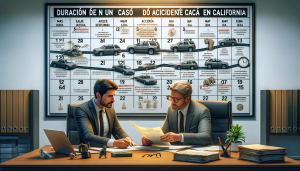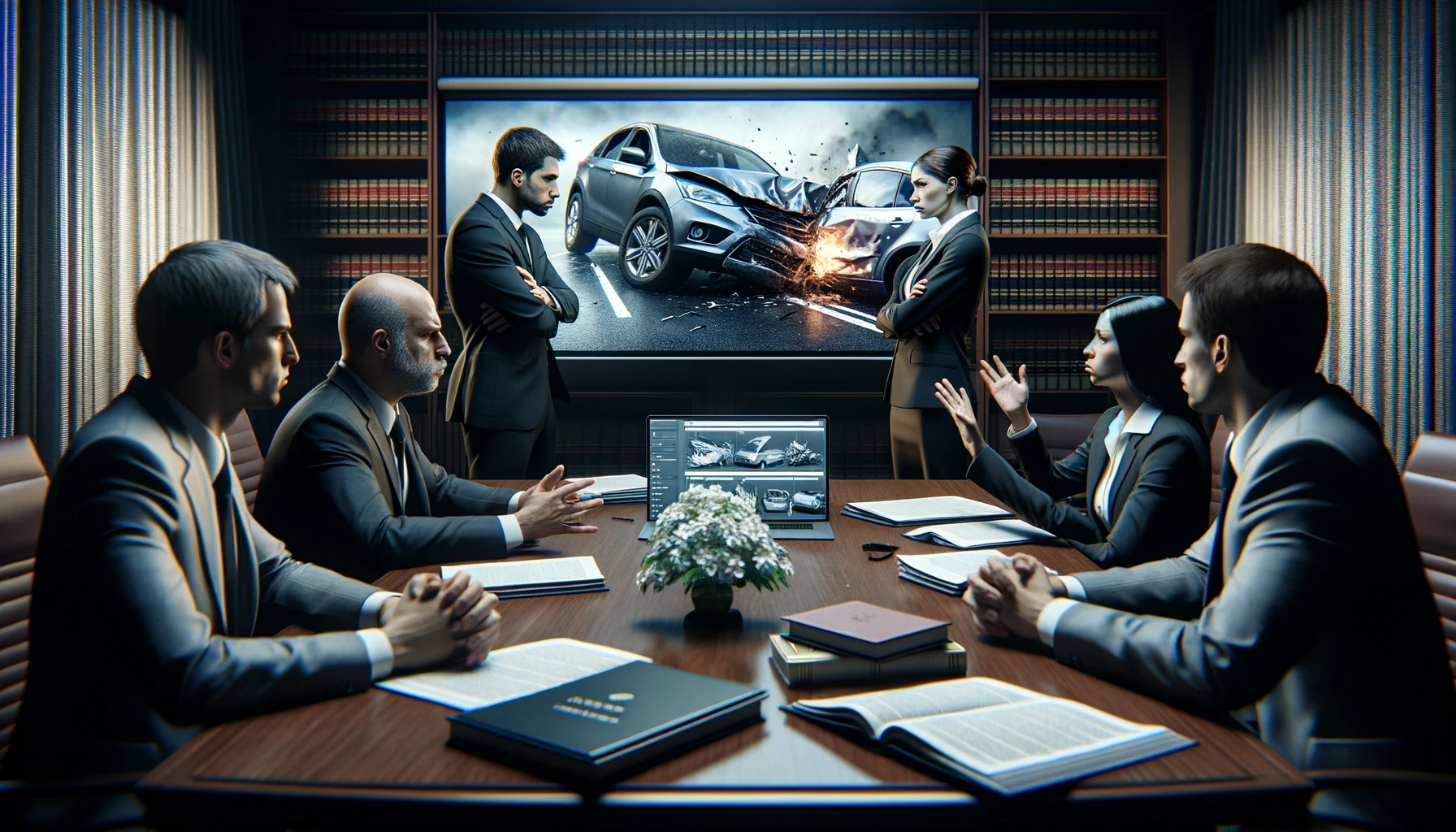Understanding the Lawsuit for Accident
Grasping the Basics
Understanding a lawsuit's intricacies can be quite daunting, but we will start by explaining the basics. A lawsuit for an
Accident is a legal dispute that arises when one party suffers harm from an accident or
Injury, and someone else might be legally responsible for that harm. The responsible individual's insurance company may be obligated to pay for medical bills, rehabilitation therapy, lost wages, as well as pain and suffering.
What is Negligence?
In many accident lawsuits, the fundamental concept is negligence. Negligence is legally defined as the failure to behave with the level of care that someone of ordinary prudence would have exercised under the same circumstances. In other words, negligence occurs when a person behaves in a careless way, which leads to
Injury or damage to another person. If it is found that you were negligent, you might be required to compensate the other party.
Role of Insurance Companies
After an
Accident occurs, especially vehicular accidents, insurance companies play a pivotal role. They often handle routine
Car accident claims, the majority of which involve property damage. However,
Accidents involving serious forms of
Injury or disputes may require legal representation. It's important to understand how to navigate such discussions or negotiations with these insurance providers.
The Lawsuit Process
If negotiations fail and a satisfactory agreement cannot be reached, the injured party may decide to file a lawsuit. The process begins with the drafting of a complaint, which outlines your legal arguments, the damages you've suffered, and your demand for compensation. The person filing the lawsuit is referred to as the plaintiff, while the person against whom the lawsuit is filed is called the defendant. The defendant must then respond to the lawsuit within a specified time limit.
The Legal Defense
If you are being sued, it's critical to comprehend the different defenses available. Your defense will depend on the specifics of the accident and your role in it. Common defenses can include asserting that the plaintiff was partly (or entirely) at fault or disputing the plaintiff's claimed damages. It's recommended to work with a legal professional who can guide you through these processes and formulate the best possible defense.
The Importance of Getting Legal Representation
When you're sued for an
Accident, it's essential to realize the significance of immediately seeking legal representation. Engaging a lawyer during such a time can equip you with the necessary resources to tackle the situation more effectively. There are several reasons why getting legal representation is important.
Understanding the Legal Landscape
Navigating the world of law can be daunting and complex. Laws vary from state to state and understanding their intricacies requires professional knowledge. A lawyer will guide you through the legal maze, helping you understand the charges and potential outcomes. They will explain your rights and provide insight into how the law applies in your particular scenario.
Protection Against Self-Incrimination
Without proper legal counsel, there's a risk that you could inadvertently say or do something that may hurt your case. Lawyers advise you on what to say and do at each step of the process, thus ensuring that you don't unintentionally admit guilt or violate any regulations that could have a negative impact on your case.
Expert Negotiation Skills
When faced with a lawsuit, there's always a possibility of negotiation. An experienced attorney will know when is the right time to negotiate and how to do so effectively. They can help you secure a reasonable settlement, reducing or even dismissing your liability.
Representing Your Interests in Court
If your case goes to trial, having an attorney is even more critical. An attorney will not only present your side of the story in the best possible light, but they will also cross-examine witnesses, challenge evidence presented by the plaintiff, and advocate for your rights. This level of representation can significantly influence the outcome of your case.
In conclusion, securing legal representation when you're sued for an
Accident is crucial. It ensures that you have someone on your side who knows the law, understands the process, and can argue effectively on your behalf. It may mean the difference between winning and losing your case.
Gathering and Preserving Critical Evidence
Identifying Crucial Evidence
The first step towards gathering and preserving evidence is identifying what is critical. Evidence might include photos from the
Accident scene, medical reports, police reports, witness statements, and anything else that can demonstrate what happened during the incident, who was involved, and how it has impacted you. Categorize each piece of evidence based on what it proves or disproves.
Preserving Physical and Digital Evidence
It's important to ensure your evidence remains in good condition until it's needed for court. Physical evidence should be stored in a safe, dry location to prevent damage. Photos, text messages, emails, or other digital evidence should be saved, backed up, and printed if possible. It's also essential to maintain the original format and not alter any digital evidence.
Securing Witness Statements
Witness statements can be a vital part of your case. Promptly gather these after an accident occurs, as memories can fade over time. Record the contact information of witnesses and consider having an attorney present when collecting their account of the incident to ensure it's done correctly and professionally.
Documenting Medical Treatment
Any medical treatment received as a result of the
Accident should be thoroughly documented. This includes medical reports, receipts for payments, prescription details, and even a diary of physical and emotional symptoms experienced post-accident. These documents can help quantify the extent of your injuries and provide a basis for any claim of damages.
Protecting against Spoliation of Evidence
Spoliation refers to the intentional, negligent, or inadvertent destruction or significant alteration of evidence, making it unusable in court. To protect against this, collect redundancy copies of crucial evidence, communicate with all parties to manage and preserve evidence related to the case, and consider getting a spoliation letter from your attorney that advises other parties of the need to preserve evidence.
Communicating Effectively With Your Lawyer
Establish Open and Regular Communication
One of the key aspects of ensuring smooth communication with your lawyer is establishing a pattern of consistent, regular updates. You should know when and how often you can expect to hear from your lawyer, whether it's daily, weekly, or bi-weekly. It could be through emails, phone calls, or face-to-face meetings. This consistent communication will allow you to stay updated about the progress of your case.
Understanding Legal Language
Legal terminologies can often be complex and confusing for those without a legal background. It is your lawyers’ duty to explain the law in a simple and understandable way. You should ask your lawyer to avoid excessive jargon and instead provide explanations in layman's terms. Don't hesitate to ask for clarification if something is not clear.
Preparation and Honesty
Thoroughness and honesty in providing all necessary information to your attorney can make a significant difference in your case. Prepare properly for each interaction with your attorney, gather all necessary documents, and recall as many details as possible regarding the
Accident. Any withholding of information can hamper your case significantly.
Set Clear Expectations
It's crucial to establish what you expect from your lawyer and what they expect from you right from the start. Discuss parameters such as the timeline, potential outcomes, costs, and the strategy your lawyer intends to use for your defense. Having these expectations outlined from the beginning can prevent confusion or disputes down the line.
Evaluate Your Lawyer's Performance
Like any professional relationship, it's important to evaluate the services rendered by your lawyer. Are they keeping you updated? Is your lawyer meeting or exceeding the expectations you both set at the beginning? If you feel that your lawyer is not providing adequate representation, discuss your concerns. This evaluation will ensure that you stay actively involved in your case and get the best representation possible.
Negotiating a Settlement: Pros and Cons
Advantages of Negotiating a Settlement
One notable advantage of negotiating a settlement is the opportunity for a quicker resolution. Court processes can be long and drawn-out, often extending for more than a year. A settlement cuts down on these lengthy time frames significantly, allowing parties to reach an agreement in a matter of months or even weeks.
Another positive aspect is the reduction of legal fees. Attorneys charge per hour, so the longer your case drags out, the more you will have to pay in lawyer fees. By settling, you can save significantly on these costs as it concludes the matter faster.
Additionally, a settlement ensures a certain degree of control over the outcome. In court, the decision is entirely up to the judge or the jury. A negotiated settlement allows both parties to have a say in the final agreement, reducing unpredictability.

Disadvantages of Negotiating a Settlement
While there are many advantages to negotiating a settlement, there are a few potential downsides to consider. One of them is the fact that you may receive less than what you might have been awarded had you gone to trial and won.
Parties are often unwilling to disclose all the relevant information during negotiations which may result in an inequitable settlement. This is because unlike court proceedings, settlements lack the rigorous rules of evidence and mandatory disclosure of information, potentially leaving one party at a disadvantage.
There is also a psychological aspect to be considered; agreeing to a settlement might leave a party feeling like they've lost or given in, especially if they believe their case was strong.
Deciding between a Trial and a Settlement
The choice between going to court and negotiating a settlement depends on a variety of factors. These include your financial capacity, the strength of your case, your willingness to accept risk and uncertainty, and your emotional readiness to go through potentially lengthy and stressful court proceedings.
It may be useful to seek legal advice, weighing the potential costs and rewards in both situations. While a settlement might seem like the fastest and most cost-effective option, your unique circumstances could make a trial the more advantageous choice.
A crucial thing to remember when deciding between a settlement and a court trial is that each case is unique, so what worked for someone else might not necessarily work for you. This decision should be made in consultation with an experienced attorney who understands your situation and can provide informed advice.
Going Through the Court Process: What to Expect
1. Notification and Response
When you are sued for an accident, the initial step in the court process is receiving a legal document known as a "summons". This is your official notification that you're being sued, usually delivered by a sheriff or process server. Along with the summons will be a "complaint", detailing the plaintiff's claims and the damages they are seeking.
Within a specified period, typically 20 to 30 days, you need to respond with an "answer" where you admit or deny each of the allegations. Failing to respond in this time frame could result in a default judgment against you, meaning the plaintiff automatically wins their case. Consequently, it's crucial to consult with a lawyer immediately upon receiving a summons.
2. Discovery Phase
Following your response, the lawsuit enters a phase known as "discovery". Both parties gather evidence supporting their case during this time. The discovery process can include depositions, where witnesses answer questions under oath, and interrogatories, which are written questions that must be answered truthfully.
Also, documents relevant to the case are exchanged, such as medical records,
Accident reports, and any photographs or videos of the accident scene. This phase can be time-consuming but is essential to build a robust defense.
3. Settlement Negotiations
Before the trial begins, there is usually an opportunity for settlement negotiations. Most
Personal Injury cases are resolved during this phase without going to trial. Mediation or arbitration may be used to facilitate these discussions. If both sides can agree on a fair compensation amount, the case will end here.
However, if a settlement cannot be reached, the case will move to trial. Having a skilled attorney to negotiate on your behalf can significantly influence whether a satisfactory settlement can be reached.
4. Trial Proceedings
If a settlement isn't agreed upon, the case will proceed to trial. Trials can be before a judge (bench trial) or a jury. The plaintiff presents their case first, followed by the defendant. Both sides call witnesses and present evidence in support of their argument.
It's important for defendants to remain calm and professional throughout the trial, regardless of the proceedings. After both sides have presented their case, the judge or jury decides on the verdict. The verdict could be in your favor, in the plaintiff's favor, or there can be a mixed verdict, where the blame is shared.
5. Post-Trial Actions
The court process doesn't always end with the trial verdict. If you're not satisfied with the outcome, you might be able to appeal the decision, given that there is a legal ground to do so. The appeals process can take several months or even years.
Remember, it's crucial to maintain open communication with your lawyer throughout every step of the court process. Their advice and guidance are invaluable when you're navigating such complex situations.
Maintaining Composure After the Lawsuit
Handling Emotions Positively
Lawsuits, particularly those pertaining to
Accidents, can lead to an array of intense emotions, including shock, anger, guilt, and anxiety. It is paramount to manage these feelings appropriately instead of allowing them to consume you. Engage with a support network of trusted friends, family, or professionals who can provide emotional aid during this challenging time.

Learning from the Experience
Once the initial emotional shock has subsided, try to view the lawsuit as a learning experience rather than a personal attack. Reflect on the
Accident, drawing constructive lessons where possible. Recognizing and correcting any potential mistakes can help prevent similar situations in future.
Stay Engaged Professionally
During the course of a lawsuit, it's important to maintain professionalism in all aspects of life. Continue performing your job duties diligently, taking care not to let your personal issues impact your professional life. This helps in maintaining a sense of normality and reduces stress.
Seeking Appropriate Legal Advice
A lawsuit can raise numerous legal questions and dilemmas. Seeking advice from legal professionals is essential in understanding the potential consequences and the best way forward. A well-informed attorney can guide you through your rights, responsibilities, and legal options.
Practice Self-Care
Lastly, don't forget the importance of self-care during this tough period. Regular exercise, a healthy diet, adequate sleep, and relaxation techniques such as meditation or yoga can significantly aid in maintaining your mental and physical health. Keeping yourself healthy helps in thinking clearly and making better decisions.
Conclusion: Being sued for an
Accident can be a stressful and daunting experience, but knowing what steps to take can help you navigate the situation more effectively. It's crucial to respond promptly, gather evidence, and seek legal advice to protect your rights and interests. By staying informed and proactive, you can work towards a favorable resolution to the lawsuit.
Look for an attorney who has the right legal resources for your legal needs.
Contact us here on the
Warmuth Law website or through our hotline 888-517-9888.
Frequently Asked Questions (FAQ's)
1. What should I do if I'm sued for an Accident?
If you're sued for an accident, the first step is to review the lawsuit carefully and understand the allegations against you. Next, notify your insurance company and gather evidence related to the accident, such as photos, witness statements, and police reports.
2. Do I need to hire a lawyer if I'm sued for an accident?
It's highly advisable to consult with a lawyer experienced in
Personal injury or accident cases. A lawyer can help you understand your legal rights, develop a defense strategy, and represent you in court if necessary.
3. What if I believe I'm not at fault for the Accident?
If you believe you're not at fault for the accident, it's essential to gather evidence to support your defense. This may include witness statements, expert opinions, and documentation of any relevant traffic laws or regulations.
4. What happens if I ignore the lawsuit?
Ignoring a lawsuit can have serious consequences, including a default judgment entered against you. It's crucial to respond to the lawsuit within the specified timeframe and participate in the legal process to protect your rights.
5. Can I negotiate a settlement if I'm sued for an Accident?
Yes, you can negotiate a settlement with the other party or their insurance company to resolve the lawsuit out of court. However, it's essential to consult with your lawyer before agreeing to any settlement terms to ensure they are fair and reasonable.













